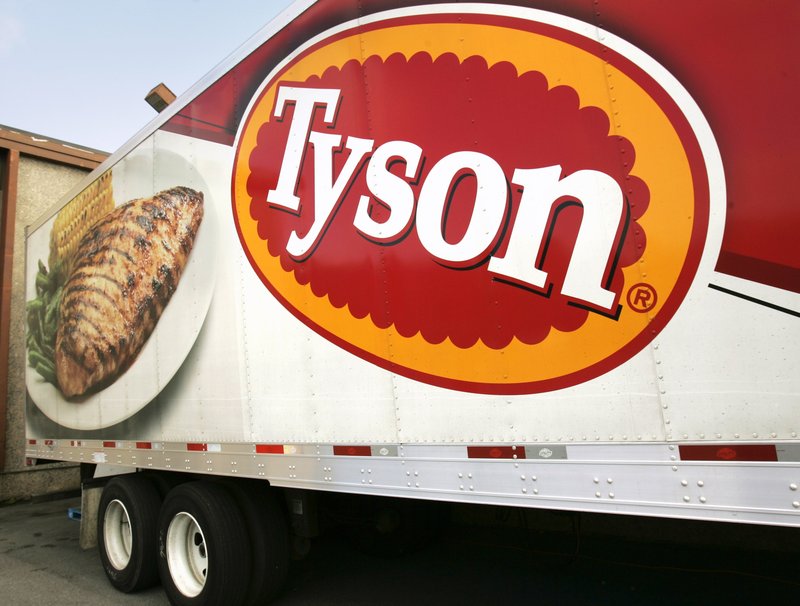Tyson Foods Inc. on Thursday reported 2021 first-quarter income of $472 million, or $1.28 per share, down from a year ago though beating Wall Street expectations.
Results were offset by settlement fees related to chicken price-fixing litigation.
Sales were $10.46 billion, a 3% decline from the same quarter last year.
Dean Banks, Tyson's president and chief executive, said in a morning conference call with analysts that business segments were strong as the company continued to manage the effects of the covid-19 pandemic.
After months of worker infections, absenteeism and other issues, Tyson is starting to administer vaccines to workers. Last week, plant workers in North Carolina began receiving vaccines under the state's distribution plan, which includes residents older than 65. In preparation for when more shots are available, Tyson has been surveying workers to see who wants the vaccine.
"The health and safety of our team members remains our top priority," Banks said. During the quarter, Tyson spent $120 million on personal protection equipment, increased sanitation, testing and other covid-19 measures.
Banks said he was proud of the company's workers this quarter as they navigated continued market volatility and was optimistic for the future.
[CORONAVIRUS: Click here for our complete coverage » arkansasonline.com/coronavirus]
For the three months that ended Jan. 2, Tyson exceeded $1 billion in operating income on an adjusted basis.
Total sales were hampered mostly by the chicken business, which experienced headwinds from covid-19. Tyson also reported a legal contingency that lowered chicken results.
Earnings per share, adjusted for the legal costs, were $1.94, beating estimates of $1.52 from FactSet and $1.65 from Stephens Inc.
Stephens analyst Ben Bienvenu said in a research brief that the earnings beat came from unexpectedly higher gross profits and lower general expenses, partially offset by lower sales and depreciation and amortization expenses.
Chicken sales were $2.8 billion, a 14% decline from a year ago. Prices increased, but were offset by declining volumes.
Last month, Tyson agreed to settle all claims brought by defendants related to the broiler chicken price-fixing litigation in a Chicago federal court for $221.5 million. Combined with production expenses, the settlement cost the company $320 million.
Meanwhile, beef and pork sales increased to $4 billion and $1.4 billion, respectively. Prepared foods sales stayed relatively flat from a year ago.
Beef volumes increased, but were partially offset by lower prices because of an abundance of market-ready cattle. Beef income rose 54% to $528 million with margins of 13.2%. The segment had a $55 million gain from a recovery of cattle inventory.
Pork volumes decreased as processing plants were idled temporarily during the quarter, but were partially offset by higher prices as demand increased. Pork income declined 39% to $116 million with margins of 8.1%.
Prepared foods sales were $2.1 billion during the quarter. Despite steady retail growth, volumes declined because of limited food service and production activity during the pandemic. Higher raw material costs increased prices. Prepared foods income rose 68% to $266 million with margins of 12.6%.
International and other sales were $469 million, down 6%. Segment income rose 10% to $11 million.
In Tyson's fiscal 2021 outlook, the company expects prepared foods results to improve and for pork results to stay strong, just not as strong as in 2020. It also is bracing for lower chicken results as grain prices continue to climb and for beef results to be in line or slightly lower than last year.
Stewart Glendinning, executive vice president and chief financial officer, said in the call that the chicken business is likely to face headwinds from grain risk as prices continue to climb.
Tyson is expecting fiscal 2021 sales to be somewhere between $42 billion and $44 billion.
Capital expenditures used for production expansions, animal well-being, infrastructure replacements and other costs are expected to be between $1.3 billion and $1.5 billion in fiscal 2021. The company is preparing to spend $440 million on covid-19 expenses alone.
Banks said the company is always working to remove unnecessary costs and invest in the right areas.
Tyson this week said it would buy a 49% stake in a Malaysian food manufacturer. According to a Malayan Flour Mills Berhad shareholder filing, the assets will cost more than $100 million.
Tyson had $2.4 billion in cash and cash equivalents at the start of the year, and $4.2 billion in liquidity. It repaid $750 million of its $1.5 billion term loan this month and is expecting net interest expenses to be $430 million this fiscal year.
The company did not report restructuring, severance and other related charges in the quarter.
The expected tax rate should be about 23%, according to the company's latest earnings report.
Tyson shares fell more than 5%, or $3.94, to close Thursday at $65.34 on the New York Stock Exchange. The stock has traded as high as $81.70 and as low as $42.57 in the past year.
The company held its annual shareholders meeting via webcast later Thursday morning.
Shareholders approved a number of recommended proposals, including a new slate of directors nominated by the board, the selection of PricewaterhouseCoopers LLP as accountant and the reinstatement of Tyson's stock incentive plan.
They also rejected three shareholder proposals that called for Tyson to expand its lobbying disclosures, report on human rights due diligence, and revise the company's shareholder voting structure so that each share would equal one vote.
The current voting structure comprises two stock types: Class A, which is worth one vote per share; and Class B, worth 10 votes per share and largely owned by the Tyson family, which accounts for the majority of the voting power, according to the company's latest proxy statement.
Vote tallies were not disclosed, unlike in previous years.
Shareholders elected energy technology executive Maria Claudia Borras of Oilfield Services to the board of directors, expanding Tyson's board to 15 members.

